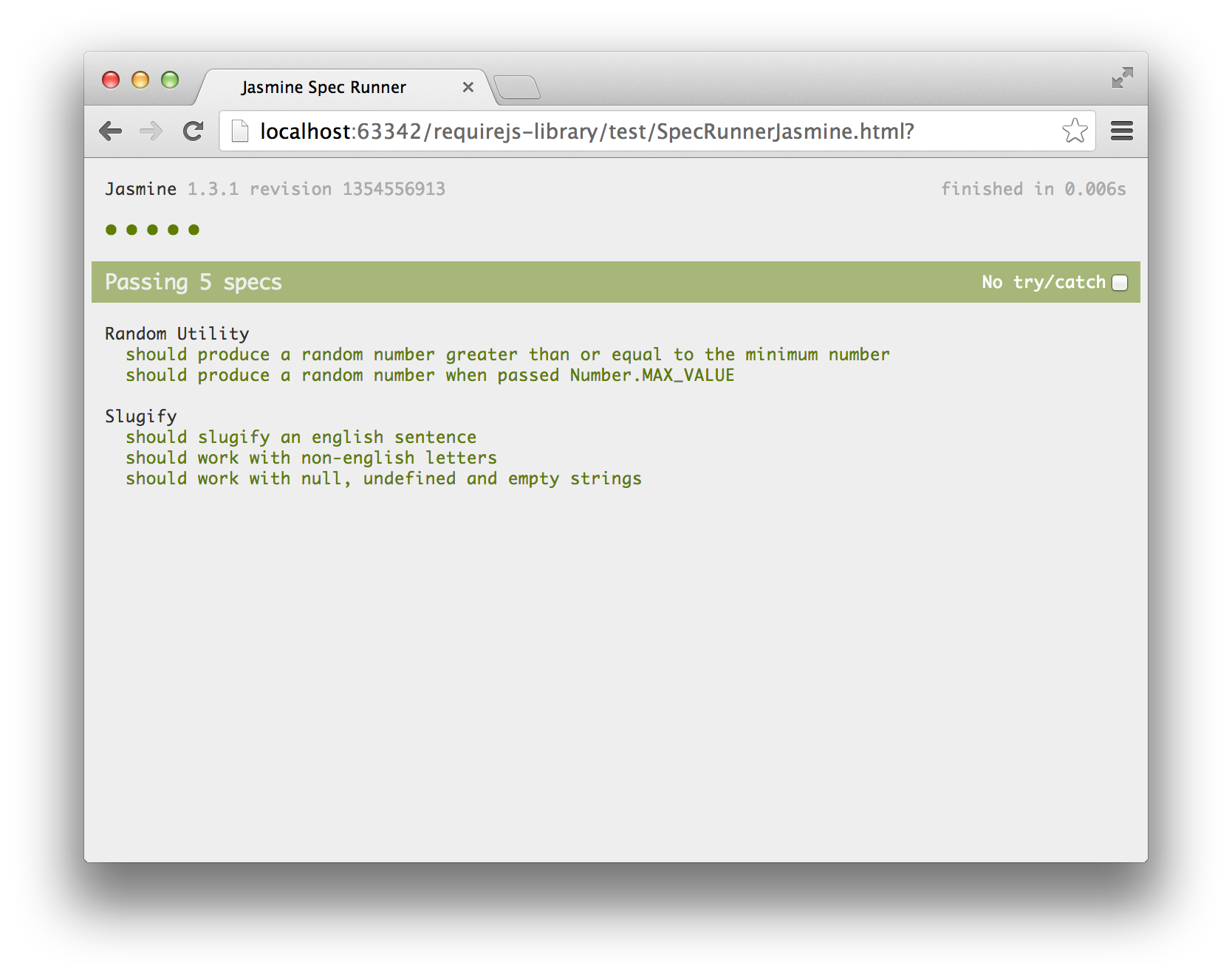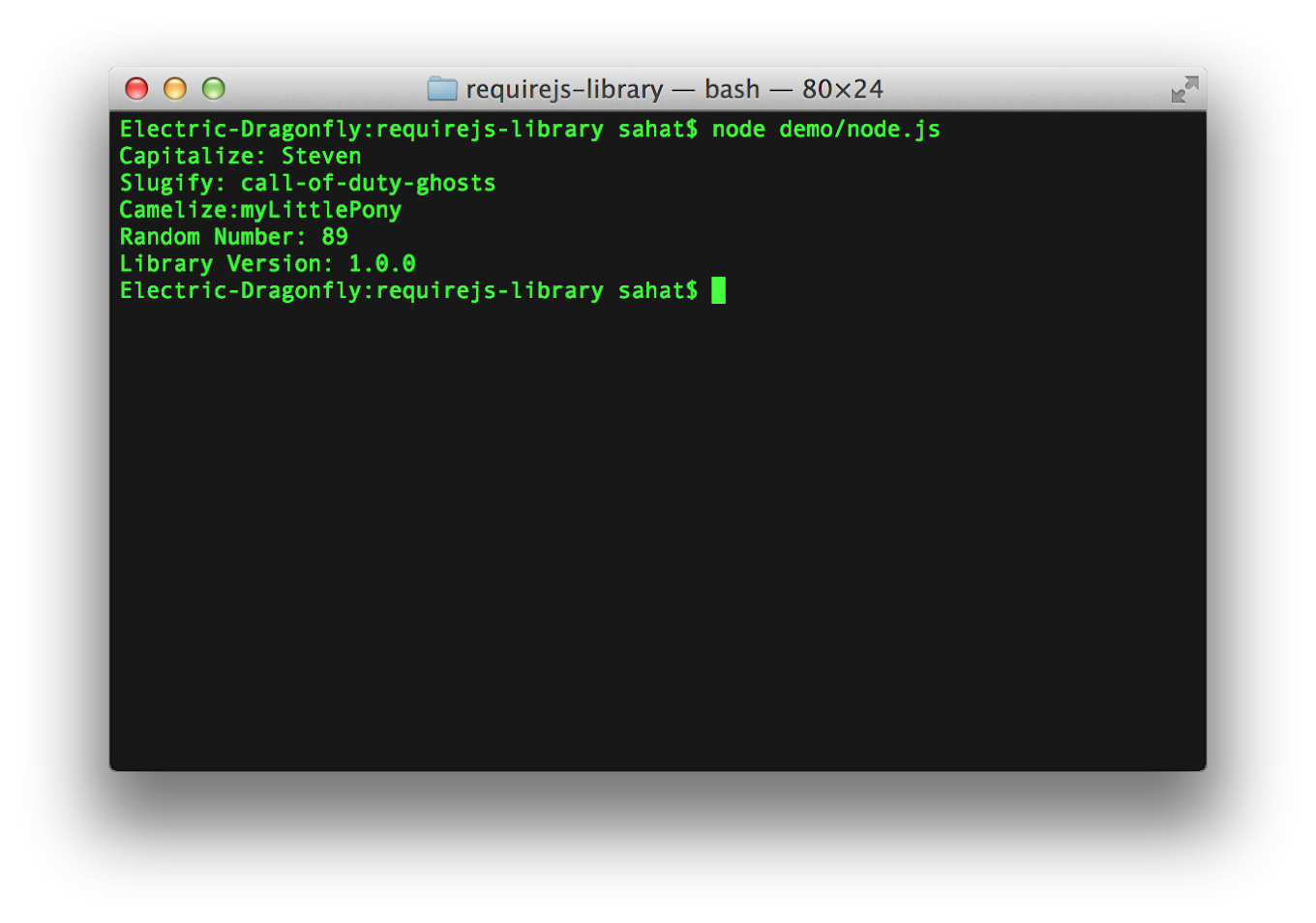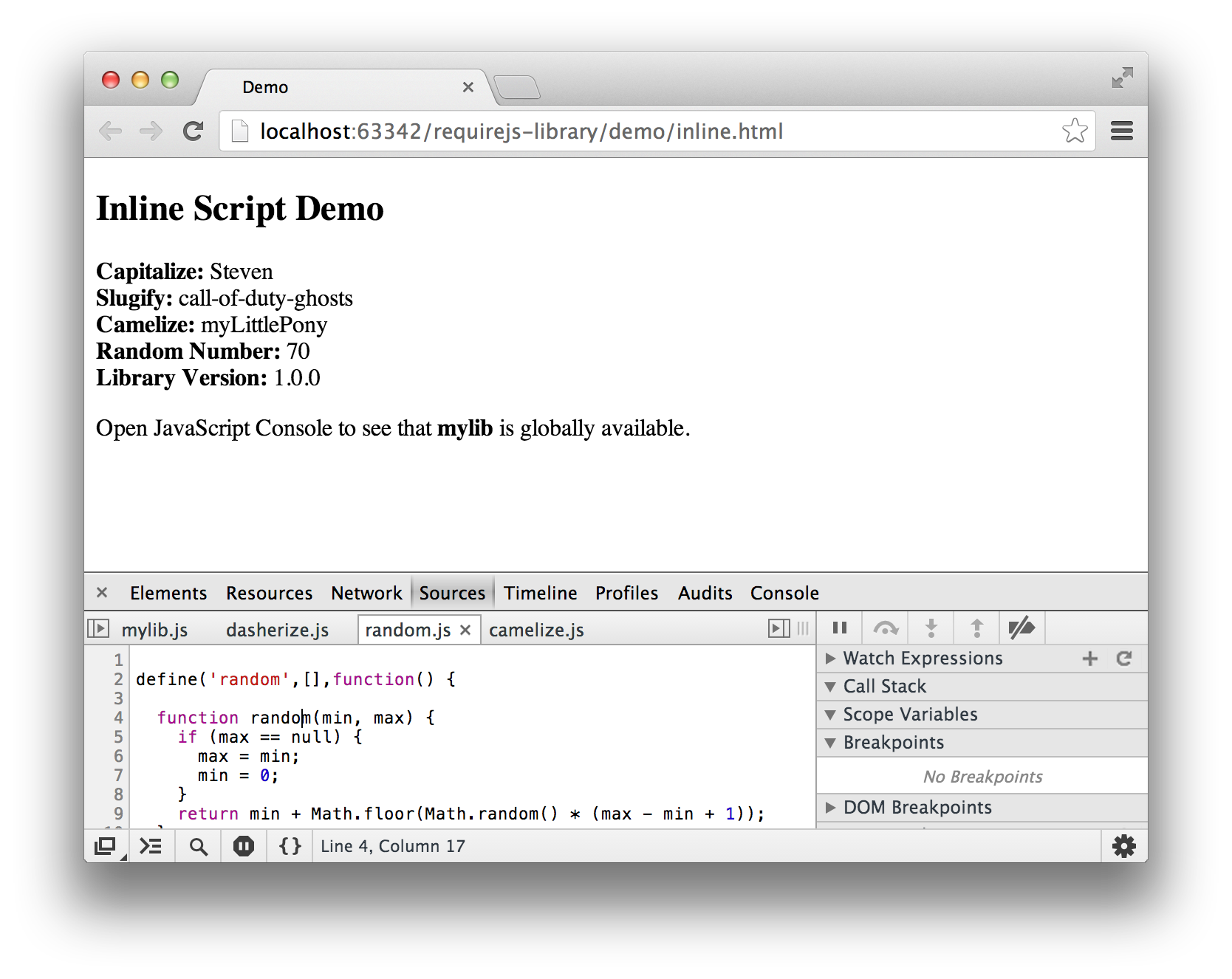The project depends on Bower and Gulp.js. Assuming you already have Node.js installed on your system, run the following command:
sudo npm install -g gulp bower
Next, clone the repository and install project dependencies:
# Fetch only the latest commits.
git clone --depth=1 git@github.com:sahat/requirejs-library.git
cd requirejs-library
bower install
npm installWith Bower you get the following libraries:
- Almond - A replacement AMD loader for RequireJS, providing the minimal AMD API footprint.
- Require.js - Used as an asynchronous module loader.
- Jasmine - Popular BDD testing framework.
- Mocha - Another great testing framework.
- Chai - BDD/TDD assertion library (used with Mocha).
And with npm you get the following packages:
- Gulp - Ultra-fast JavaScript task runner.
- Require.js - Used as an optimization tool that lets you to compile a single, minified JavaScript file.
- Karma - Awesome JavaScript test runner.
This library is flexible enough to work as an inline <script> declaration,
Require.js module, or in this case as a Node.js module:
You can run all demos right away out of the box, but if you have changed any of the src files, simply run the following command to re-build the library and start watching for changes:
gulp
Require.js optimizer comes with a built-in support to generate source maps. It is already enabled in gulpfile
by default, but feel free to disable source maps. Refer to this article
to enable source maps in Google Chrome, if you haven't already done so.
Go to the test folder and run SpecRunnerJasmine.html and you should see the following page:

slugify.js, random.js.
For your project pick either Jasmine or Mocha + Chai, whichever one you prefer the most. Both testing frameworks
are excellent.
The other file, capitalize.js is written for the Mocha testing framework, using Chai's should assertions.
Run the SpecRunnerMocha.html and you should see the following page:
And lastly, if you prefer to run your tests with Karma, simply run:
npm test
Or if you have installed Karma globally via npm, first run karma start, then karma run. It will perform
a single test run using Jasmine testing framework via PhantomJS headless browser. Both testing framework
and browser are configurable in karma.conf.js.
I have set autoWatch: false by default.
So, if you use something like JetBrains WebStorm 7 for development, then you should keep autoWatch turned off.
Here is the step-by-step guide:
Running JavaScript tests with Karma in WebStorm 7
- demo - examples with Inline, AMD, CommonJS script loading
- dist - minified JavaScript file + source map
- src/mylib.js - entry-file that pulls all other modules
- src/_start.js - adds compatibility for AMD, CommonJS and Browser globals
- src/_end.js - serves the same purpose of the initial require() call that data-main does
- test/spec - jasmine and mocha specs
- test/SpecRunnerJasmine.html - standalone jasmine html spec runner
- test/SpecRunnerMocha.html - standalone mocha html spec runner
- karma.conf.js — karma test runner configuration
- test/test-main.js — configures karma to use Require.js for the tests
- When you are changing library's name from mylib to YOUR_LIBRARY_NAME, update names in the following locations:
- src/mylib.js: filename
- gulpfile.js: out,
out: "dist/YOUR_LIBRARY_NAME.js" - gulpfile.js: include,
include: ['almond', 'YOUR_LIBRARY_NAME'] - src/_start.js: else statement,
window.YOUR_LIBRARY_NAME = factory(); - src/_end.js: return statement,
require('YOUR_LIBRARY_NAME');
If you have any suggestions, or found a bug please open a GitHub issue and I will get to it as soon as I can.
The MIT License (MIT)
Copyright (c) 2014 Sahat Yalkabov
Permission is hereby granted, free of charge, to any person obtaining a copy of this software and associated documentation files (the "Software"), to deal in the Software without restriction, including without limitation the rights to use, copy, modify, merge, publish, distribute, sublicense, and/or sell copies of the Software, and to permit persons to whom the Software is furnished to do so, subject to the following conditions:
The above copyright notice and this permission notice shall be included in all copies or substantial portions of the Software.
THE SOFTWARE IS PROVIDED "AS IS", WITHOUT WARRANTY OF ANY KIND, EXPRESS OR IMPLIED, INCLUDING BUT NOT LIMITED TO THE WARRANTIES OF MERCHANTABILITY, FITNESS FOR A PARTICULAR PURPOSE AND NONINFRINGEMENT. IN NO EVENT SHALL THE AUTHORS OR COPYRIGHT HOLDERS BE LIABLE FOR ANY CLAIM, DAMAGES OR OTHER LIABILITY, WHETHER IN AN ACTION OF CONTRACT, TORT OR OTHERWISE, ARISING FROM, OUT OF OR IN CONNECTION WITH THE SOFTWARE OR THE USE OR OTHER DEALINGS IN THE SOFTWARE.





